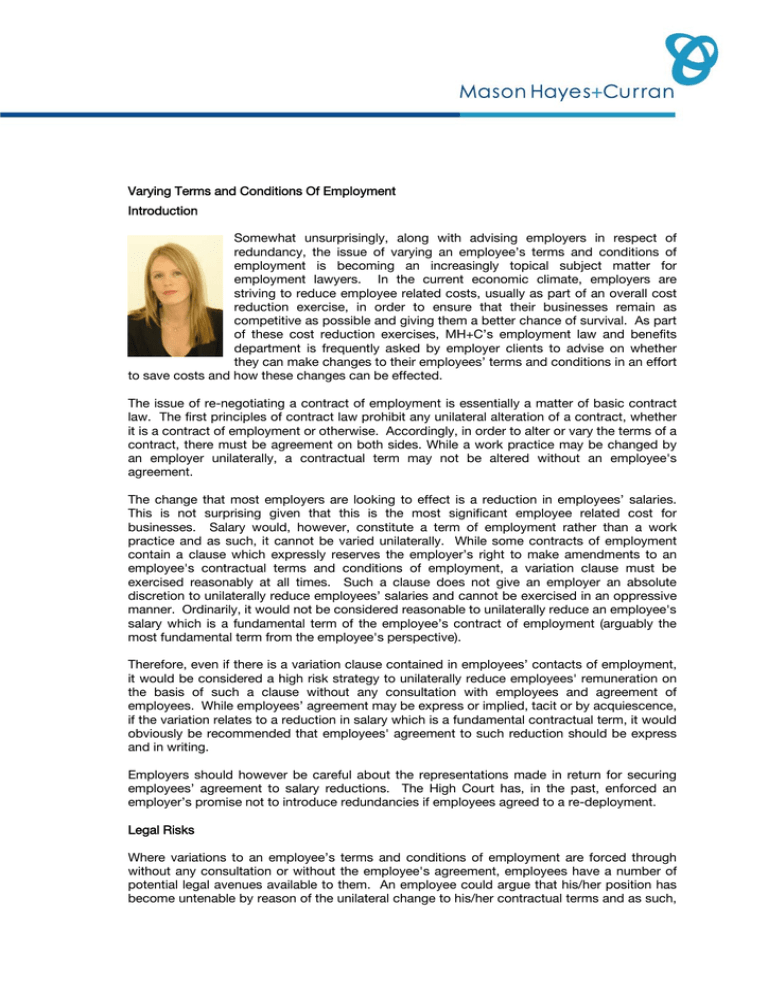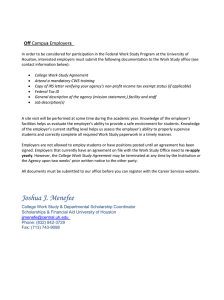
Varying Terms and Conditions Of Employment
Introduction
Somewhat unsurprisingly, along with advising employers in respect of
redundancy, the issue of varying an employee’s terms and conditions of
employment is becoming an increasingly topical subject matter for
employment lawyers. In the current economic climate, employers are
striving to reduce employee related costs, usually as part of an overall cost
reduction exercise, in order to ensure that their businesses remain as
competitive as possible and giving them a better chance of survival. As part
of these cost reduction exercises, MH+C’s employment law and benefits
department is frequently asked by employer clients to advise on whether
they can make changes to their employees’ terms and conditions in an effort
to save costs and how these changes can be effected.
The issue of re-negotiating a contract of employment is essentially a matter of basic contract
law. The first principles of contract law prohibit any unilateral alteration of a contract, whether
it is a contract of employment or otherwise. Accordingly, in order to alter or vary the terms of a
contract, there must be agreement on both sides. While a work practice may be changed by
an employer unilaterally, a contractual term may not be altered without an employee's
agreement.
The change that most employers are looking to effect is a reduction in employees’ salaries.
This is not surprising given that this is the most significant employee related cost for
businesses. Salary would, however, constitute a term of employment rather than a work
practice and as such, it cannot be varied unilaterally. While some contracts of employment
contain a clause which expressly reserves the employer’s right to make amendments to an
employee's contractual terms and conditions of employment, a variation clause must be
exercised reasonably at all times. Such a clause does not give an employer an absolute
discretion to unilaterally reduce employees’ salaries and cannot be exercised in an oppressive
manner. Ordinarily, it would not be considered reasonable to unilaterally reduce an employee's
salary which is a fundamental term of the employee’s contract of employment (arguably the
most fundamental term from the employee's perspective).
Therefore, even if there is a variation clause contained in employees’ contacts of employment,
it would be considered a high risk strategy to unilaterally reduce employees' remuneration on
the basis of such a clause without any consultation with employees and agreement of
employees. While employees’ agreement may be express or implied, tacit or by acquiescence,
if the variation relates to a reduction in salary which is a fundamental contractual term, it would
obviously be recommended that employees' agreement to such reduction should be express
and in writing.
Employers should however be careful about the representations made in return for securing
employees’ agreement to salary reductions. The High Court has, in the past, enforced an
employer’s promise not to introduce redundancies if employees agreed to a re-deployment.
Legal Risks
Where variations to an employee’s terms and conditions of employment are forced through
without any consultation or without the employee's agreement, employees have a number of
potential legal avenues available to them. An employee could argue that his/her position has
become untenable by reason of the unilateral change to his/her contractual terms and as such,
the employee had no alternative but to consider himself/herself constructively dismissed.
Constructive dismissal claims in Ireland are brought to either a Rights Commissioner or the
Employment Appeals Tribunal (EAT) under the Unfair Dismissals Acts 1977-2007. Alternatively,
an employee could take a claim for breach of contract to the civil courts and as part of such
claim, could seek injunctive relief to prevent the unilateral variation by his/her employer. A
disgruntled employee could also take a claim to a Rights Commissioner under the Payment of
Wages Act 1991 claiming that there has been an unlawful deduction made to his/her
remuneration. Further, an employee could bring a trade dispute under the Industrial Relations
Acts 1946-2004. A non-legal risk that is also worth mentioning is the affect on employee
morale and industrial relations within an organisation if changes are forced through without
employee consultation and agreement.
Conclusion
In the past number of years it has proved very difficult to get employees to accept changes to
their terms and conditions of employment which are to the employees’ detriment. However, it
is our experience that in more recent times, by reason of prevailing economic circumstances,
employees are much more receptive to changes to their terms and conditions of employment if
these changes increase their job security and mean that other more unpleasant cost saving
measures such as redundancy can be put off or avoided for the time being.
For further information, please contact:
Aoife Sweeney, Solicitor
Tel: + 353 1 614 5276
Email: asweeney@mhc.ie
The content of this article is provided for information purposes only and does not constitute
legal or other advice. Mason Hayes+Curran (www.mhc.ie) is a leading business law firm with
offices in Dublin, London and New York.
© Copyright Mason Hayes+Curran 2009. All rights reserved.





